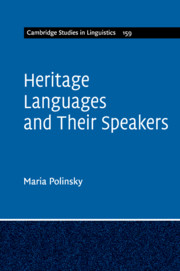Crossref Citations
This Book has been
cited by the following publications. This list is generated based on data provided by Crossref.
Meir, Natalia
2018.
Morpho-Syntactic Abilities of Unbalanced Bilingual Children: A Closer Look at the Weaker Language.
Frontiers in Psychology,
Vol. 9,
Issue. ,
Puig-Mayenco, Eloi
Cunnings, Ian
Bayram, Fatih
Miller, David
Tubau, Susagna
and
Rothman, Jason
2018.
Language Dominance Affects Bilingual Performance and Processing Outcomes in Adulthood.
Frontiers in Psychology,
Vol. 9,
Issue. ,
Mitrofanova, Natalia
Rodina, Yulia
Urek, Olga
and
Westergaard, Marit
2018.
Bilinguals’ Sensitivity to Grammatical Gender Cues in Russian: The Role of Cumulative Input, Proficiency, and Dominance.
Frontiers in Psychology,
Vol. 9,
Issue. ,
Kasstan, Jonathan R
Auer, Anita
and
Salmons, Joseph
2018.
Heritage-language speakers: Theoretical and empirical challenges on sociolinguistic attitudes and prestige.
International Journal of Bilingualism,
Vol. 22,
Issue. 4,
p.
387.
Domínguez, Laura
Hicks, Glyn
and
Slabakova, Roumyana
2019.
TERMINOLOGY CHOICE IN GENERATIVE ACQUISITION RESEARCH.
Studies in Second Language Acquisition,
Vol. 41,
Issue. 2,
p.
241.
2019.
Heritage Languages.
Vol. 58,
Issue. ,
Lohndal, Terje
Rothman, Jason
Kupisch, Tanja
and
Westergaard, Marit
2019.
Heritage language acquisition: What it reveals and why it is important for formal linguistic theories.
Language and Linguistics Compass,
Vol. 13,
Issue. 12,
Bayram, Fatih
Kupisch, Tanja
Pascual y Cabo, Diego
and
Rothman, Jason
2019.
TERMINOLOGY MATTERS ON THEORETICAL GROUNDS TOO!.
Studies in Second Language Acquisition,
Vol. 41,
Issue. 2,
p.
257.
Brown, Joshua R.
2019.
Historical heritage language ego-documents: From home, from away, and from below
.
Journal of Historical Sociolinguistics,
Vol. 5,
Issue. 2,
Romano, Francesco Bryan
2020.
Ultimate attainment in heritage language speakers: Syntactic and morphological knowledge of Italian accusative clitics.
Applied Psycholinguistics,
Vol. 41,
Issue. 2,
p.
347.
Abraham, Werner
2020.
Modality in Syntax, Semantics and Pragmatics.
Goebel-Mahrle, Thomas
and
Shin, Naomi L.
2020.
A corpus study of child heritage speakers’ Spanish gender agreement.
International Journal of Bilingualism,
Vol. 24,
Issue. 5-6,
p.
1088.
Kostadinova, Viktorija
Yáñez-Bouza, Nuria
Wiemann, Marco
Dreschler, Gea
Gregersen, Sune
Gyuris, Beáta
Allan, Kathryn
Scott, Maggie
Anderwald, Lieselotte
Leuckert, Sven
Kraš, Tihana
Cogo, Alessia
Gan, Tian
Parise, Ida
Ting, Shawnea Sum Pok
Da Silva, Juliana Souza
Hansen, Beke
and
Cushing, Ian
2020.
I English Language.
The Year's Work in English Studies,
Vol. 99,
Issue. 1,
p.
1.
Liu, Ying
Qi, Ruying
and
Di Biase, Bruno
2020.
Cross-linguistic influence of L2 on L1 in late Chinese-English bilinguals.
Journal of Second Language Studies,
Vol. 3,
Issue. 2,
p.
290.
Aboh, Enoch O.
2020.
Lessons From Neuro-(a)-Typical Brains: Universal Multilingualism, Code-Mixing, Recombination, and Executive Functions.
Frontiers in Psychology,
Vol. 11,
Issue. ,
Polinsky, Maria
and
Scontras, Gregory
2020.
Understanding heritage languages.
Bilingualism: Language and Cognition,
Vol. 23,
Issue. 1,
p.
4.
Montrul, Silvina
and
Bateman, Nicoleta
2020.
The Acquisition of Differential Object Marking.
Vol. 26,
Issue. ,
p.
285.
Montrul, Silvina
and
Bateman, Nicoleta
2020.
The Acquisition of Differential Object Marking.
Vol. 26,
Issue. ,
p.
285.
Thordardottir, Elin
2020.
The Cambridge Introduction to Applied Linguistics.
p.
99.
van Baal, Yvonne
and
Natvig, David
2020.
CALL FOR PAPERS: NJL SPECIAL ISSUE: Heritage languages and bilingualism.
Nordic Journal of Linguistics,
Vol. 43,
Issue. 1,
p.
1.





